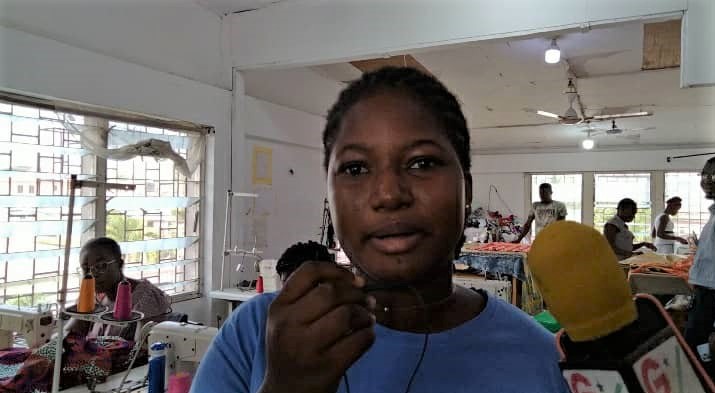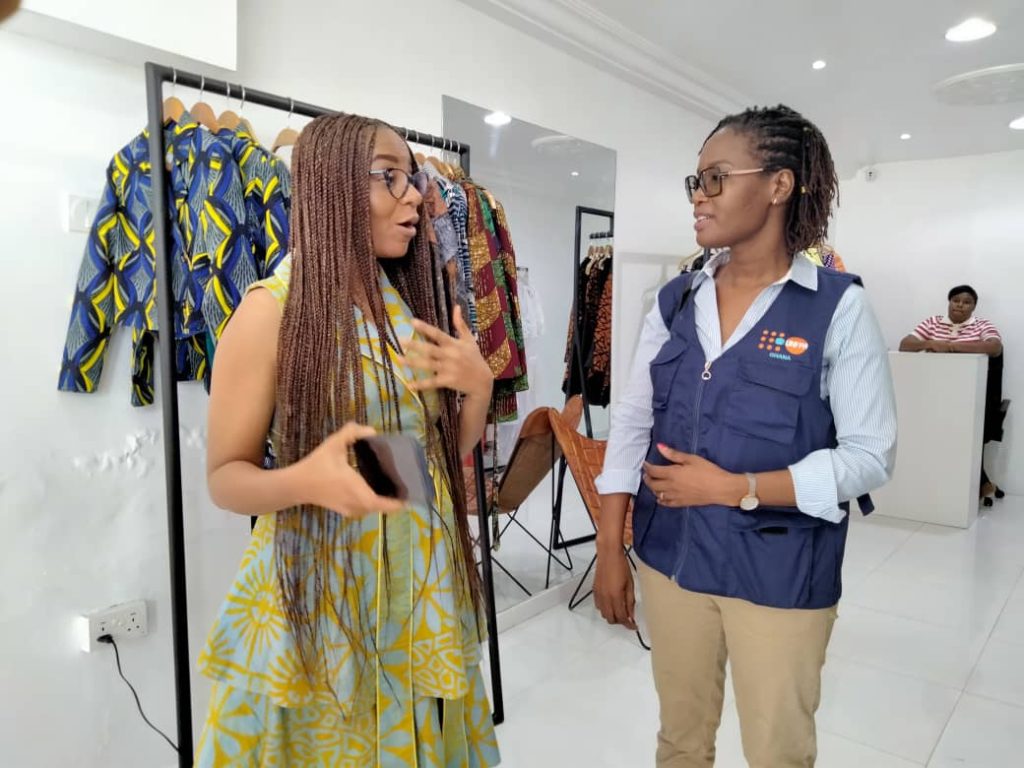A Feature by Christiana Afua Nyarko and Leonora Asare
Accra, July 29, GNA – Irene Asiwome Ziddah, a 19-year-old woman, who hails from Mafi-Kumase in the Volta Region, could only make it to the Junior high School which she completed in 2021.
She was unable to continue her education after her father, the family’s major breadwinner, died.
Her widowed mother could neither raise the funds for school nor the training in fashion design that she had initially expressed interest in learning.
That left the teenager bored, confined to her home and her basic needs unattended to due to lack of employment.
Irene’s life, however, changed a few months after she encountered the Assembly Member from her community through whose help she got enrolled in the training programme, “Fashion Expressions: The Stories She Wears” Project, which was being run by PRADA Group, in partnership with United Nations Population Fund (UNFPA).

Similarly, Pamela Afatsawo, 21- year-old and an old student of the Keta Business SHS, also had her dreams of attending a tertiary institution cut short after her mother died and the father unwilling to support.
“I lost my mum after secondary school and didn’t get the chance to go to the university, because there was no one to sponsor me. My dad left us after our mother died and I have never heard of him since,” she said in an interview with the Ghana News Agency.
She ended up on the streets until her encounter with a UNFPA Official, who helped her to enrol in the same project as Irene.
The “Fashion Expressions: The Stories She Wears” Project was founded in 2021 after the UNFPA, the UN Agency for Sexual and Reproductive Health, (SRH) and PRADA Group, an Italian multinational luxury fashion company and brand, entered into a partnership to train young vulnerable women in selected countries.
The programme, which began in June 2022, is currently being piloted in Ghana and Kenya, and has enrolled thirty young women drawn from marginalised backgrounds and communities such as rural-urban migrants, head-porters known as “Kayaye,” Teenage mothers, Street girls, among others.
Although the programme is to promote the social impact of fashion and its ability to foster socio-economic development, the beneficiaries were first taken through a six-month empowerment training programme on reproductive health rights and making informed choices.
Eighteen out of the thirty trainees selected were then posted to ten Ghanaian fashion houses to undergo another six months of industrial attachment to enhance their knowledge of fashion techniques, including local traditions and styles, and create knowledge and opportunities with local fashion companies among other benefits.
Both Irene and Pamela narrated their stories of transformation, saying they were glad to be empowered with knowledge and skills in fashion that ensure their economic independence.
Pamela indicated that aside from the fashion training, she had also acquired knowledge on reproductive health and could now defend her rights, and hope to establish herself as a fashion designer one day.
In a tour to check on the progress of some of the beneficiaries, Emmily Naphambo, the UNFPA Deputy Country Representative and Officer in Charge, said the Agency’s partnership with PRADA would create an opportunity for many young women to contribute to social productivity and the national economy via entrepreneurship.

Madam Naphambo said the empowerment trainings help the beneficiaries to defend themselves against vulnerabilities such as gender-based violence and also be able to make informed decisions and choices regarding SRH.
“For now, we partnered with about ten brand houses who have been willing to take around fifteen girls to teach them the trade. In the future we are looking at expanding this to many brands.
“We have the private sector coming in like the brand houses are doing now, that is the way to go because it means we are going to reach more young girls and give them opportunity so they become productive citizens,” she said.
Ms Pokua Poku Mouhtiseb, the Founder and Creative Director of Poqua Poqu, fashion brand at Osu in Accra, which is a partner under the project, said both Pamela and Irene, had fared well and urged others to enrol.
Other partner Fashion brands and businesses who trained the women were confident that their guidance will help to enhance the lives of many other vulnerable persons.
Data from the UN Women country fact sheet state that despite some progress made on women’s rights, many are still facing vulnerable situations that expose them to Gender-based violence and sexual exploitation due to unemployment.
In Ghana, 19.3 per cent of women aged between 20 to 24 years were married or in a sexual union before age 18.
The data further put the adolescent birth rate at 78 per 1000 of women aged between 15 to 19 years as of 2018, an increase from 75.1 per 1000 in 2016.
As of February 2021, only 14.6 per cent of seats in Parliament were held by women whilst in 2018, 10.2 per cent of women aged 15-49 years reported a subjection to physical and sexual violence by a current or former intimate partner in the previous 12 months.
Women and girls aged 10 years and above spend 14.4 per cent of their time on unpaid care and domestic work compared to 3.5 per cent spent by men.
The above and other statistics are what makes many young women vulnerable in the country.
GNA